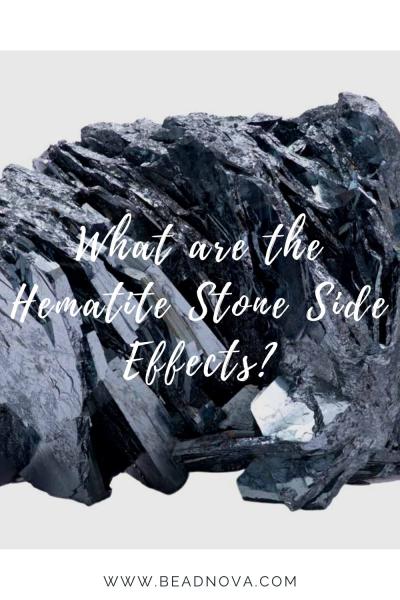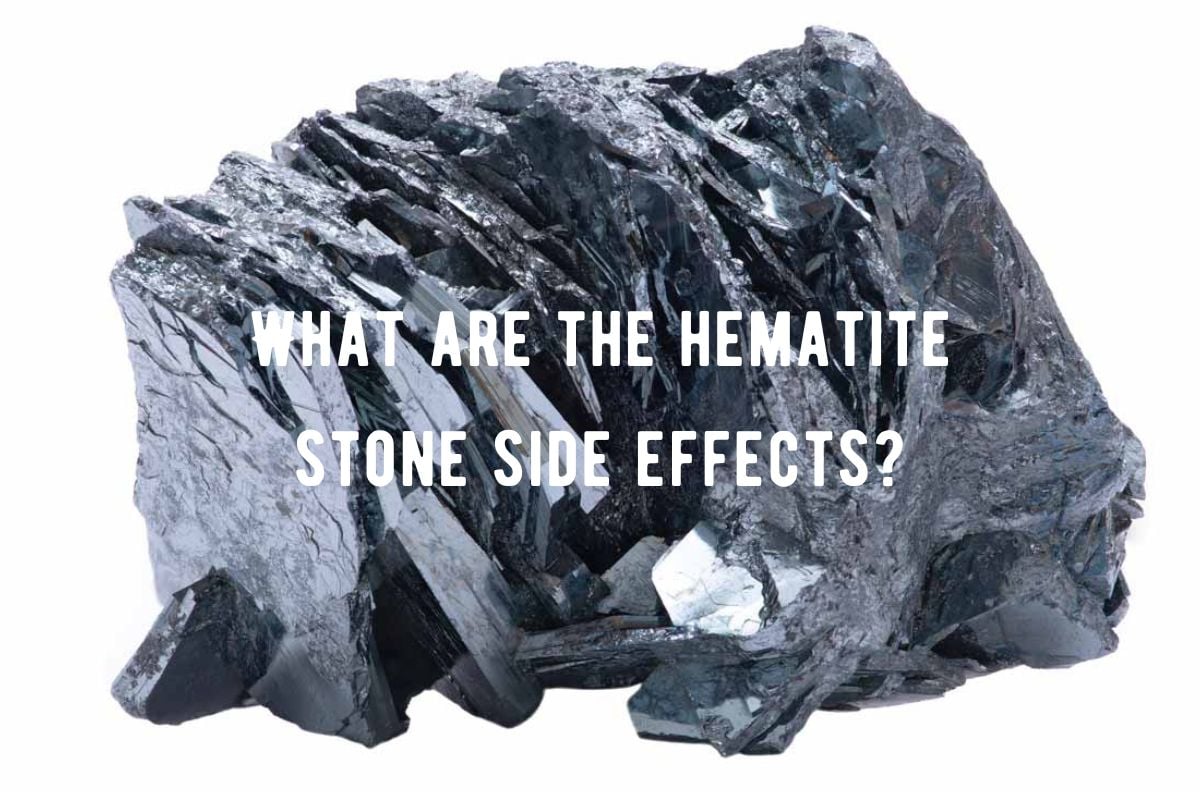What Are The Side Effects Of Hematite?
Hematite has been utilized to make bracelets, pendants, and other jewelry because it is inexpensive and can be polished quickly. However, before consistently using this metal, it is essential to be aware of hematite side effects.
- Sensitiveness to allergens: Hematite can cause allergic reactions in certain people, particularly those with particularly delicate skin. Signs of an allergic response include the appearance of redness, itching, swelling, and rashes.
- Causes itchy skin: Hematite can cause skin irritation, which is a common adverse effect. Iron, which is abundant in the stone, is known to cause skin irritation, which is why it is avoided.
- Horrible internal organ damage: Because of its erosive properties, it could also cause bleeding in any organ or tissue. Wearers of hematite jewelry should take precautions to avoid submerging their bodies in water for extended periods of time or while bathing since this could cause the metal to corrode.
- Dehydration: One of the hematite’s most typical adverse effects is dehydration. The stone’s high absorption rate allows it to draw excess fluid from the skin.
- A shorter life span: Hematite’s ability to reduce life expectancy is one of its most publicized risks. This is due to the high concentration of lead in the stone.
- Lack of hormonal equilibrium: Hormonal disruption is a common complaint among those who use hematite. Mood swings, impatience, fluctuations in body weight, and altered libido are just some of the ways this might appear.
- Metal poisoning: Hematite is hazardous due to dense metals like mercury and leads that collect within the mineral over time. Heavy metal toxicity can result from ingesting these metals.
Table of Contents
Is Hematite Safe To Wear?
Hematite is an effective healing stone with many applications. Stress and anxiety are reduced, blood flow is enhanced, and the immune system is strengthened, so the claim goes.
Some even go so much as to say that donning a piece of hematite jewelry might help you get a better night’s rest, feel more energized in the morning, and reduce your pain. But first, it is crucial to understand the risks involved before utilizing hematite.
The list of potential side effects includes things like itchy skin, headaches, lightheadedness, and nausea. You should stop using the gemstone and see a doctor if these symptoms persist.
Exposure to hematite over extended periods has been linked to several potential reactions. Therefore, to make a well-informed purchase decision, it is recommended to peruse online evaluations and consult a knowledgeable sales associate or jeweler.
Can You Wear Hematite Every Day?
Hematite is durable enough to be worn every day if you so choose, but there are some considerations to keep in mind. The stone’s anchoring energy may be too much for some people, and it may also cause them to experience headaches.
Some people may experience itching or a slight greening of their skin. If you experience any discomfort while wearing jewelry, take it off and clean it well before wearing it.
If you clean your jewelry after the first time, the destructive effects should go away. Wearing hematite regularly reduces the likelihood of experiencing these negative consequences.
Start with a modest dose and build up your tolerance to it. Also, think about what you’re wearing with it; if you’re feeling very energetic, maybe avoid wearing jeans or other casual clothing.
However, this calming stone has the potential to become a prized possession after you’ve adjusted to its presence. It is often believed that the advantages of hematite can be maximized by letting the stone come into contact with the skin.
Jewelry enthusiasts can shop for hematite in the shape of rings, brooches, earrings, and links. In addition, creating a cabochon from a piece of pure hematite allows you to use it in jewelry.
Is Hematite Water Safe?
Do not immerse hematite in water; it is not advised. Hematite, with a Mohs hardness of only 5, is soft enough to dissolve in water. It’s not a good idea to submerge weaker stones for an extended period, and even more, prolonged submersion can harm the structure and dull the beauty of more challenging stones.
The stone’s aesthetic value also declines when exposed to water. The stones lose some of their lusters as a result. Water can also cause cracks within a stone, which alters how light is reflected once it’s inside. In the long run, this might ruin its luster and decrease its worth because of its impaired optical characteristics.
Hematite is a softer stone that should not be submerged in water. In the stone, water seeps into fissures and causes them to expand. These cracks might not be visible at first, but they weaken the stone with time, making it more susceptible to shattering.
Wiping hematite with a cloth is the most secure cleaning approach. However, a toothbrush can be pretty helpful when cleaning cracks and crevices. Mechanical devices, including ultrasonic cleaners or steam, should also be avoided while cleaning hematite.
If this isn’t sufficient, you can momentarily submerge the stone in water and remove it. The stone probably won’t be damaged by this quick submersion. Next, ensure the stone is completely dry by twisting it several times after removal.
Who Should Not Wear Hematite?
One needs to be aware of the possible adverse effects of wearing hematite before deciding. For example, there have been reports that hematite can cause skin irritation, headaches, and even a magnetic attraction in some persons.
Some folks have even described experiencing sick or dizziness. Discard the hematite and see a doctor if you have any adverse reactions. While it’s true that some people have problems while wearing hematite, it’s also true that many people wear it without any problems.
If you want to try hematite jewelry but are worried about potential negative consequences, it’s best to start with something little, like a bracelet or necklace, that won’t break the bank and can be removed quickly if needed. Black tourmaline and other gemstones generate energies similar to hematite and may offer the same advantages with less danger.
Wearing or touching hematite jewelry can cause some people skin irritation, headaches, and nausea. Stop using hematite and see a doctor if you have any adverse reactions.

More articles about Hematite you may like:
The Ultimate Guide To Using Healing Crystals for Beginner
Which Hand To Wear Crystal Bracelet More Properly? Complete Guide to Know
Black Crystals List: Names, Meaning, Healing, and Uses



